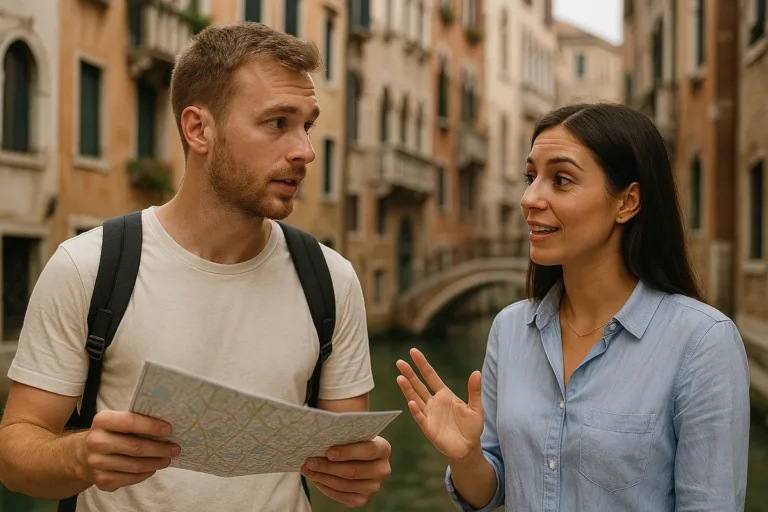Why It’s Important to Learn How to Ask “Do You Speak English?” in Italian
“Do you speak English in Italian?” — this question can truly save your trip to Italy. Whether you’re ordering pasta in Rome or trying to catch a train in Milan, knowing how to ask this question helps you connect and find help when you need it most.
In touristy spots, many Italians may understand English. But once you step into a cozy town or visit a local trattoria, that may not be the case. That’s where learning a few key Italian English phrases can go a long way. You don’t need to be fluent. Just knowing how to ask for English politely can make locals more open and eager to assist you.
Asking English in Italian isn’t just about words. It’s about cultural respect. Even starting with a friendly “Scusi” before your question shows good manners and makes a better impression. For example, imagine this: You’re in Florence and lost. You walk up to a local and say, “Scusi, parla inglese?” They instantly smile because you tried. You’re more likely to get kind help and maybe even make a friend.
Let’s not forget, learning to ask this question opens the door to English conversation in Italy. You might find locals who want to practice their English too! Plus, as you grow in confidence, you might start switching from “parla inglese?” to more casual or advanced phrases.
And if you’re working on your pronunciation or trying to sound natural in other languages too, our 9 Quebec Pronunciation Tips to Sound Like a Native Speaker is a fun read for building your listening and speaking muscles.
Table of Contents
The Most Polite Way: “Parla inglese?” and When to Use It
The most classic way to ask “Do you speak English in Italian?” is “Parla inglese?” This form is polite and formal, perfect for asking strangers or older individuals in Italy.
Let’s break it down:
Parla = Do you speak (formal)
Inglese = English
So when should you use this? Anytime you want to be respectful. For example:
🔹 When speaking to hotel staff or taxi drivers
🔹 At restaurants, especially fancier ones
🔹 Asking for directions from older locals
This is one of those basic Italian phrases that never fails. And remember, tone and body language help! Smile, maybe even start with “Scusi” or “Mi scusi,” and you’ll sound extra polite.
Using this phrase helps you speak English in Italy without sounding too direct or demanding. Italians value courtesy, and even small efforts to show respect in their language are always appreciated.
Want to boost your overall fluency with similar useful expressions? Check out our guide on the 12 Best English Lessons Online to Master English Quickly.
If you’re also using English at work, our partner site Master Business English in 2025: Vocabulary, Idioms, and Conversations can help you stay professional and fluent anywhere in the world.

Casual and Friendly: Saying “Parli inglese?” in Daily Situations
Want to sound a bit more relaxed and friendly? Then say “Parli inglese?” It still means “Do you speak English in Italian?” but it uses the informal form “parli” instead of the formal “parla.”
When can you use it? Here are some perfect situations:
👉 Talking to someone your age or younger
👉 Asking a store clerk in a casual setting
👉 Chatting with a local on the train or at a cafe
This version is great when you want to build friendly connections. For instance, if you’re having gelato and the vendor looks your age, “Parli inglese?” sounds more natural than the formal option.
When practicing English conversation in Italy, this phrase often opens the door to fun, informal chats. And who knows? Maybe your new friend will want to practice their English with you too!
This phrase is also part of many basic Italian phrases that help travelers get around smoothly.
To feel even more confident in these conversations, be sure to read our Lets Speak English 8 Proven Tips for Confident Conversations. It’s packed with strategies for speaking clearly and comfortably.
Expressing Urgency or Help: Using “C’è qualcuno che parla inglese?” Effectively
Sometimes, you really need help. In those moments, a longer phrase like “C’è qualcuno che parla inglese?” (“Is there someone who speaks English?”) can be more effective. It’s clear, polite, and conveys urgency.
Let’s say you miss your train or lose your phone. This phrase helps you find someone fast. It works great in public places:
🏢 Train stations
🏥 Hospitals
🏧 Airports or tourist help desks
Using this shows not only that you respect the local language, but also that you know how to ask clearly when in need. That’s an important part of speaking English in Italy: knowing how to get help quickly.
It’s one of those Italian English phrases that should be on every traveler’s must-know list.
And if you want to learn other natural and kind ways to ask for English, take a look at our guide on 7 Polite Ways to Ask Do You Speak English Naturally.
Also, if you’re curious how English works as a global language, check out the history of the english language to see how it grew and spread!

Sounding More Local: Gestures and Tone That Italians Use
Saying “Do you speak English in Italian?” is helpful, but sounding Italian takes more than words. It’s about how you speak.
Italians are known for expressive gestures and melodic tone. So when you ask something like “Parla inglese?” try these tips:
🖐 Open your hands while asking — it shows friendliness
🙂 Smile and nod to show you’re not demanding, just hopeful
🌟 Use a soft, rising intonation to sound more engaging
These little touches make your English conversation in Italy smoother. Locals will feel more comfortable and may even admire your effort to blend in.
Combine tone and gesture with the basic Italian phrases you’ve learned so far, and you’ll come across as charming and approachable.
If you’re also learning other languages while traveling, don’t miss 10 Easy Ways to Ask Do You Speak English in Spanish to add even more tools to your communication toolkit.
Practical Travel Phrases Beyond “Do You Speak English in Italian”
Of course, learning how to say “Do you speak English in Italian?” is just the beginning. Here are a few more phrases that will help you navigate Italy with ease:
🌐 “Dove si trova…?” — “Where is…?” (e.g., Dove si trova il bagno?)
🌐 “Quanto costa?” — “How much does it cost?”
🌐 “Non parlo bene l’italiano.” — “I don’t speak Italian well.”
🌐 “Mi può aiutare?” — “Can you help me?”
These Italian English phrases are your best friends when exploring cities, shopping, or asking for help.
And remember, every small phrase you learn brings you closer to confident communication and smoother travels. Learning just one phrase well is better than memorizing a hundred and forgetting them all!
Best Places to Practice Speaking English or Italian in Italy
If you really want to get good at saying “Do you speak English in Italian?” and more, you need real-life practice! Here are some great places in Italy to try:
🏫 Language Exchange Cafes — Often found in cities like Rome, Milan, and Bologna
🌺 Local Markets — Practice asking about prices and products
🏨 Hostels or B&Bs — Friendly environments where people want to talk
📲 Apps like Tandem or HelloTalk — Chat with Italians even before your trip
All of these help you test out your basic Italian phrases in low-pressure environments.
And if you’d like help picking phrases to practice or need personalized support, feel free to Contact Us. We’re happy to help you become a confident communicator — in any language!
Related Posts

Do People in Turkey Speak English What You Should Know
Do people in Turkey speak English Learn where English is spoken and how easy it is to communicate as a traveler

Can You Speak English How to Ask and Answer Politely
Can you speak English Learn the best ways to ask and respond to this question politely in different travel and social settings

7 Books to Expand Your English Vocabulary Fast
Books to expand vocabulary help you speak and write better Discover top books that make learning new words enjoyable
